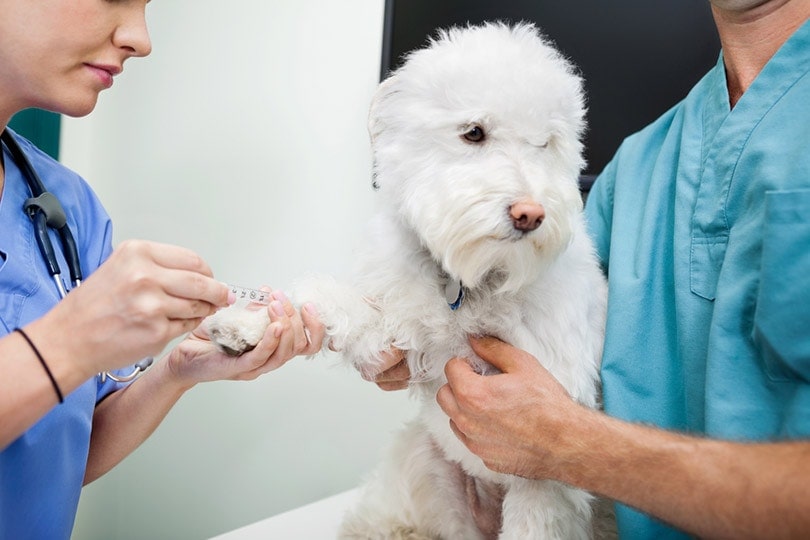One of the most important things when owning a dog is to take them for regular vet checks to ensure their health is in good shape. However, many of the checkups and disease treatments can be pretty expensive. That’s why many dog owners turn to pet insurance to help with potential treatment costs.
When it comes to health issues in dogs, heartworm is prevalent and frequently occurs in pups worldwide. If you experience this particular issue with your dog, you might be wondering if your pet insurance will cover the treatment costs.
Pet insurance can cover expenses for heartworm treatment, but you need to select a suitable policy that includes that in the offer.

What is Heartworm Disease?
Heartworm disease is a parasitic infection1 that can cause severe health issues for your dog. A pup can develop heartworm disease if it gets bitten by an infected mosquito. When a mosquito bites a dog with heartworms, it sucks out its blood and through it, the heartworm larvae end up inside the mosquito.
After some time, they’ll mature inside of it, and after that same mosquito bites another dog, it will release the heartworms into its bloodstream. After 6 months of getting bitten, the heartworms will develop into full adults, and that’s when symptoms start showing.
Heartworms live inside the lungs and heart of an infected dog, and if you don’t treat them in time, the consequences could be fatal for your pet.

How Common Is It?
Heartworm disease is widespread throughout the US. However, it’s more common in some regions of the country, such as the eastern and southern US and near the valleys of Midwestern rivers.
Pets who live outdoors are more prone to this disease, but pets living indoors are not entirely safe from it. Mosquitos typically find ways to access our homes, and it takes only one mosquito bite for your dog to get infected.
If you are looking for the best pet insurance, we recommend looking at a few different companies to compare policies and find the one that best fits your needs.
Top Rated Pet Insurance Companies:
Symptoms
Heartworm disease2 is tricky because the symptoms take time to develop, and it can take months or even years for you to realize your puppy is infected. Before the symptoms occur, you might not even know that your dog has heartworm disease, so it’s crucial to recognize them if they happen.
- How long the infection lasts
- How many adult heartworms are inside your pup’s body
- How active your dog is
It’s harder to notice symptoms in inactive dogs, or older dogs, as many indicators are more visible in active pups.
- Swollen belly
- Lethargy
- Issues with breathing
- Coughing
- Pale gums
- Short breath when running
- Decreased appetite
- Weight loss
- Collapse
- Sudden death
In severe cases, your dog could suffer from lung issues, heart failure, and damage to other organs inside its body. If you notice any of these symptoms, you should take your pup to a vet to perform a blood test to diagnose the disease.
If the test is positive, the vet will do lab work and take an x-ray to see if any organs are affected and what’s their current state. That way, they will determine if your dog can undergo heartworm treatment.

Why Is It Important to Treat Heartworm Disease?
The health of your pet should be your number one priority, and that’s why it’s vital to treat heartworm disease. In most dogs, when they get positive heartworm results, the disease is developed enough to cause damage to the lungs, heart, kidneys, liver, and blood vessels.
When that happens, your dog is at risk of dying, and even if it survives, its life longevity could be significantly lowered and endangered. Cured dogs could still suffer from permanent issues that will affect the rest of their life.
That’s why you should never turn a blind eye to any possible signs of heartworms and react promptly to ensure your pet remains healthy and safe.
Annual Costs for Treating Heartworm
Dogs that are older than 7 months need annual checkups for heartworm disease. If your puppy is infected, it will need persistent treatment until all the heartworms are gone.
Killing adult heartworms is a complex process; it can take time for your pup to feel better and be heartworm-free. Before treatment, your dog will likely need doxycycline, an antibiotic that weakens adult heartworms.
After the antibiotics, your pup will need an injection of medicine, after which you need to confine it for 30 days. The next step in the treatment process includes your dog receiving two more injections, followed by another 30 days of being enclosed.
Although the process is long, it’s vital to ensure that all adult heartworms are killed, as they represent a threat to your pup’s lungs and heart. Your dog will also need preventive medication during the treatment to prevent a new infestation.
Since the whole process is complex, the costs of such treatment typically vary between $1,000 and $3,000. The preventive medication typically costs between $25 and $150 for a 6-month supply. Of course, the costs could increase if there are significant complications or issues along the way.
Vet costs can really add up. If you’re looking for a pet insurance company, you may want to consider Lemonade, which offers balanced plans that you can customize to your pet’s specific needs.

Heartworm Prevention
As heartworm disease is widespread and the symptoms are hard to detect, practicing prevention is the best way to fight heartworms. Before starting any preventive treatment, consult your vet to find the best suitable method for your dog.
Various preventive treatments are available, such as oral prevention pills, topical creams, and even injections. Once you start with a preventative treatment method, it’s essential to stick to it and give your dog the medication regularly.
Missing a dose can be extremely harmful, and if that happens, it’s crucial to consult your vet on how to proceed to ensure your pup remains healthy.
If you need to speak with a vet but can't get to one, head over to PangoVet. It's our online service where you can talk to a vet online and get the advice you need for your dog — all at an affordable price!

Pet Insurance: Heartworm Medication and Treatment
Most pet insurance policies don’t cover heartworm treatment and medication costs, as your pup will also need preventive medication from an early age. However, some pet insurance policies include a wellness plan and an accident and illness plan, which will cover the majority of costs you would need to cover if your dog gets heartworm disease.
Insurance Companies That Cover Heartworm Treatment
Insurance companies covering heartworm disease treatment costs are not standard, making it hard to find the perfect policy for your furry friend. However, we did want to mention some insurance plans that will cover the costs of this treatment, so check them out below.
Pets Best
This company provides the best wellness and essential wellness plan that will cover a set amount each year for preventive medication for heartworm disease. They also have an accident and illness plan that can cover costs such as blood tests and X-rays. Before getting a plan, you should consult the company to verify which services are included in the policy.
Embrace
This is another company that has several plans that can be highly beneficial during a heartworm disease in your pup. They have a wellness plan and an accident and illness policy. Their wellness plan covers preventive heartworm medication—if the dog gets the infection, their accident and illness policy will cover the treatment costs.
SPOT
This company offers a preventative wellness policy and an accident and illness plan that provides a set amount for testing for heartworm disease annually. However, they will require you to co-pay, and if your dog gets heartworms, they will cover costs up to a set annual amount.


Conclusion
It’s not typical for pet insurance to cover heartworm treatment costs, so the best way to fight this disease is to practice prevention before the disease even occurs. That means taking your dog to annual checkups and using preventative medication that will keep your pup safe.
It’s the most effective and affordable way to prevent your dog from getting heartworms, which is why you should do that immediately if you haven’t already begun preventive treatment.
See also:
- Does Pet Insurance Cover Cruciate Surgery?
- Does Pet Insurance Cover Gastropexy or Bloat? Facts & FAQ
Featured Image Credit: Rawpixel.com, Shutterstock




















